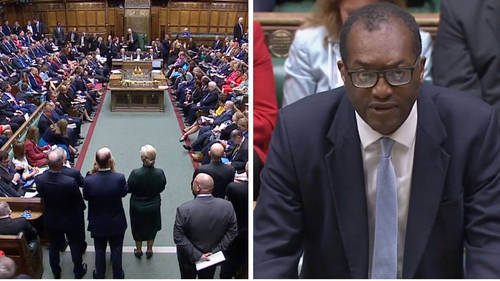
The main issue of contention during the campaign to become the new prime minister of the UK was the issue of a tax cut. A new prime minister has emerged, and the tax cut is here. However, after the announcement of the tax cuts, it is uncertain if the decision would contribute positively to the dwindling British economy.
The new mini-budget announced by finance minister Kwasi Kwarteng includes plans to cut the lowest income tax rate from 20 to 19 percent and reduce the highest rate from 45 to 40 percent. The last time the UK experienced such was in 1972.
“High tax rates damage Britain’s competitiveness. They reduce the incentive to work, invest and start a business.” Kwarteng said. “And the higher the tax, the more ways people seek to avoid them, or work elsewhere or simply work less … rather than putting their time and money to more creative and productive ends.”
The mini-budget unveiled by the Liz Truss government included several support measures to help curb the energy crisis in the UK. Other packages in the mini-budget include cancelling a planned rise in corporation tax to 25% and keeping it at 19%. The new economic plan also reversed the recent 1.25% rise in National insurance contributions and reduced the introductory income tax rate from 20 pence to 19 pence.
Other significant changes include the scrapping of a cap on bankers’ bonuses and scrapping an increase in tax rates on various alcohols.
There is also a significant cut in stamp duty, tax paid on home purchases, and the scrapping of the 45% tax paid on incomes over £150,000, taking the top rate to 40%, a move which many think is in favour of the rich.
Mr. Kwasi Kwarteng described the economic plan as a new approach that would open an era of growth.
“Growth is not as high as it needs to be … We need a new approach for a new era, focused on growth. Our aim, over the medium term, is to reach a trend rate of growth of 2.5 percent,” the finance minister said.
However, the opposition labour party does not feel the same way.
The backlash from the opposition
The finance chief of the opposition Labour party, Rachel Reeves, described the new prime minister and his finance minister as “two desperate gamblers” that prioritised big business and bankers’ bonuses over the working people because they relied on a discredited theory of “trickle-down economics.”
“The prime minister and chancellor are like two desperate gamblers in a casino chasing a losing run,” Rachel Reeves told parliament.
Ms Reeves is not alone in objecting to the new economic plan. Jo Maugham, director of the Good Law Project, described it as the “worse response to a cost of living crisis.”
“Liz Truss’ budget means that those earning a million a year will have £54,400 extra in their pockets after tax and NICs. For those earning £25,000, the equivalent figure is about £280,” Maugham said on Twitter.
The reactions from Scotland and Wales also indicate a reluctant acceptance of the new economic plan. The two first ministers of the devolved regions of the UK also criticized the plan.
The first minister of Wales, Mark Drakeford, said the mini-budget “embeds unfairness across the UK.”
“The UK Government should be offering meaningful support to those who need it the most. Instead, they’re giving tax cuts to the rich, bonuses to bankers, and protecting the eye-watering profits of energy companies,” he tweeted.
The first minister of Scotland, Nicola Sturgeon, was on the same page with his Welsh counterpart. In her remarks, she described the government’s action as “incompetence” and “recklessness.”
“The super-wealthy laughing all the way to the actual bank (tho I suspect many of them will also be appalled by the moral bankruptcy of the Tories) while increasing numbers of the rest relying on food banks – all thanks to the incompetence and recklessness of this failed UK gov,” Ms. Sturgeon tweeted.
The pound responds
Soon after the finance minister listed a series of tax cuts and announced the new economic plan, UK stocks dropped. The pound fell as much as 2% against the US dollar to a little below $1.10. It was the lowest fall of the Sterling in 37 years.
Analysts believe the uncertainties surrounding the new plan were responsible for the shake-up in the market. Jane Foley, a currency strategist at Rabobank, believes that investors were doubtful of the government’s plans.
“They’re worried that some of these tax cuts that have been announced aren’t going to be fully funded. That will result in a large amount of debt at a time when the Bank of England is going to be selling some of its holdings of UK government debt,” Foley said.
“I think this government does need to provide a lot more reassurance that it does have fiscal sensibility in order. This is not the message that’s come across this morning,” she added.












0 Comments